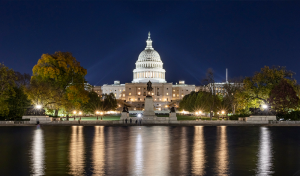
People would have a due process right to contest seizures of their data when government agents do not use a warrant. Whether people get such rights ultimately depends on whether…
By Jim Harper | January 27, 2026

At Davos this week, Demis Hassabis, the CEO of Google DeepMind, gave a standout talk about the path he believes AI will take in the coming years. While he thinks…
By Will Rinehart | January 23, 2026

“This is a case about minor Plaintiffs’ alleged addiction to Defendants’ social media platforms and the alleged adverse effects flowing from that addiction.” That’s how California Superior Court Judge Carolyn…
By Clay Calvert | January 22, 2026

A federal court recently blocked Colorado from enforcing part of a new law that compels social media platforms “to provide non-commercial disclosures to minors about the alleged health impacts of…
By Clay Calvert | January 21, 2026

The most profound way I used AI in 2025 came during one of the harder stretches my family has faced: My mother’s cancer came back. In the past, navigating this…
By John Bailey | January 20, 2026

A year ago, I shared some reflections on how I was using AI and suggested that it’s helpful to think of these tools as competent interns working remotely: earnest and…
By John Bailey | January 20, 2026

For many years, the Consumer Electronics Show (CES) displayed the potential for smart technology to transform our daily lives. At CES 2026, the reality of smart devices came to life…
By Shane Tews | January 16, 2026

Over the last year, the Abundance movement has gained traction in American political discourse. Driven by Ezra Klein and Derek Thompson’s book of the same name, Abundance challenges the progressive…
By Daniel Lyons | January 16, 2026

If we’re going to fix electricity pricing problems, we need to understand what’s actually causing them. Blaming data centers for rising electricity bills is easier than reforming how we allocate…
By Will Rinehart | January 15, 2026

In today’s digital economy, mobile apps are everywhere—and so are the entrepreneurs trying to build them. Over 3.8 million apps are available in Apple’s App Store, with new ones entering…
By Mark Jamison | January 15, 2026

Parents have valid concerns about how online environments shape their children’s behavior. However, as the House Energy and Commerce Committee advances a comprehensive package of children’s online safety bills, the…
By Shane Tews | January 13, 2026

An appellate court ruled in late November that a Florida law severely limiting minors’ ability to hold social media accounts and imposing age-verification and parental-confirmation requirements on platforms “likely” passes…
By Clay Calvert | January 13, 2026

In 2025, the landscape of digital safety for youth shifted from monitoring to integrated protection. Major platforms have moved beyond simple screen-time counters to introduce granular content filtering, mandatory age-appropriate…
By Shane Tews | January 12, 2026

There were ghosts in the old City Hall subway station when New York City Mayor Zohran Mamdani took the oath of office January 1. They were not the sentimental kind—not…
By Mark Jamison | January 12, 2026

With the second Trump administration settling into its second year, 2026 promises to bring continued evolution in technology policy. Our scholars are examining the developments likely to shape the year…
By The Editors | January 9, 2026